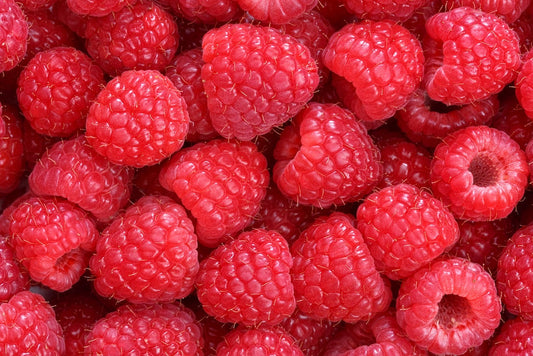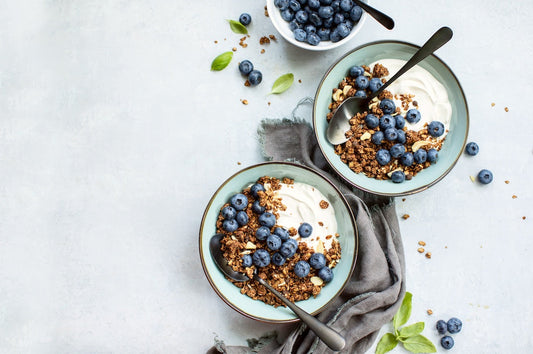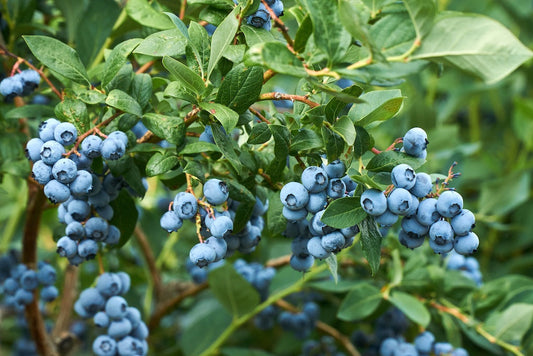The protein hype shows no signs of abating and continues to feature prominently in all major food trend studies. For us as breakfast makers, this is reason enough to take a closer look at the topic. The result? We followed the trend and launched our own sports range, “Organic Athletics,” in spring 2019 to offer you high-quality protein-rich breakfasts.
Would you like to learn more about proteins and their role in our diet? To give you the most comprehensive insight into the world of proteins, we turned once again to certified nutrition coach and TCM nutritionist Patricia Görgl and asked her to explain what proteins actually are, why we need them, and which foods are the best sources of protein from a nutritional point of view.
What exactly are proteins?
Proteins, also known as egg whites, are amino acids. These are essential building blocks for the body. Proteins play a very important role, for example, they are responsible for building cells in our hair, skin, and nails.
Proteins are also needed for the following processes:
- to maintain our immune system
- building enzymes and hormones
- transporting oxygen and fat
- building antibodies and coagulation factors
Which foods contain protein?
A basic distinction is made between plant-based and animal-based protein:
Plant-based protein
- Legumes such as beans, chickpeas, and lentils
- Grains or pseudograins such as quinoa, oats, or millet
- Nuts and seeds
- Lupins, soy, seitan
- Fruit and vegetables
Animal proteins
- Meat
- Eggs
- Dairy
How well these proteins can be absorbed is measured using what is known as biological value. This determines how well the protein can be utilized based on the amino acid composition of the food in question. The higher the value, the better the absorption or utilization.
Chicken eggs have the highest biological value, with a score of 100. However, this is a reference value that has been arbitrarily determined and therefore does not automatically mean that the protein in chicken eggs can be converted 100% into body protein. [1]
Proteins and their biological value (mixed diet)
100 – Whole chicken egg
98 – Potatoes
92 – Tuna
88 – Milk
86 – Soy protein
85 – Pork
85 – Cheese (Edam)
80 – Poultry
72 – Corn
67 – Rye
66 – Rice
64 – Whole grain rice
64 – Oatmeal
63 – White beans
50 – Hazelnuts
40-50 – Lentils
47 – Wheat flour
36 – Carrots
3 – Green peas
On average, a healthy person needs about 1g of protein per kg of body weight. Amateur athletes and strength or competitive athletes need a little more, but this should be determined on an individual basis.
Which protein is healthy?
It should also be mentioned here that, according to the DGE (German Nutrition Society) and ÖGE (Austrian Nutrition Society), animal products top the list in terms of biological value. However, Patricia would recommend covering your protein requirements with plant-based proteins as much as possible for the following reasons:
Plant-based proteins also provide us with additional micronutrients (vitamins, trace elements). With animal products in particular, the value depends on the quality of the products. Residues of antibiotics or other medications are often found in animal products from factory farming. In addition, the conditions in which animals are kept in factory farming are disastrous. All these circumstances are naturally reflected in the quality of the products.
Patricia therefore generally recommends buying products from organic farms and, ideally, from regional sources to avoid long transport routes.
Eat a balanced diet
If you eat a balanced diet and, for example, get two-thirds of your protein intake from plant-based foods, you are already on the right track. When it comes to animal-based proteins, vegetarian options (dairy products or eggs) are preferable to protein from meat.
A long-term study by Harvard Medical School came to the following conclusion:
“(...) If the proportion of animal protein increases by 10 percent in relation to total calorie intake, the risk of death increases by 2 percent overall, and the risk of dying from cardiovascular disease increases by as much as 8 percent.”
In contrast, the risk of death decreases by 10 percent if 3 percent more plant protein is included in the diet. The figures are even clearer when some of the animal protein consumed is replaced by plant protein. In particular, it is worthwhile switching from processed beef and pork (e.g., sausages) and eggs to plant proteins (...)” [2]
Conclusion
Animal protein in particular is consumed in excess in the standard diet (omnivores). Reducing your intake is certainly a good idea and has a positive long-term effect on fat metabolism, liver health, and our overall health.
Patricia also offers the following nutritional tips:
- Avoid “extremes” (e.g., low carb, high carb, etc.) in your diet as much as possible.
- Make sure you consume all macronutrients and micronutrients in sufficient quantities and tailored to your needs. An extended blood test can provide information about what you need and where you may have deficiencies.
[1] Vegan diet: Optimal protein supply through combination (https://www.deutschlandistvegan.de/vegane-ernaehrung-proteine/)
[2] Study: Plant proteins healthier than animal proteins ( https://www.pharmazeutische-zeitung.de/2016-07/studie-pflanzliche-eiweisse-gesuender-als-tierische/ )
























